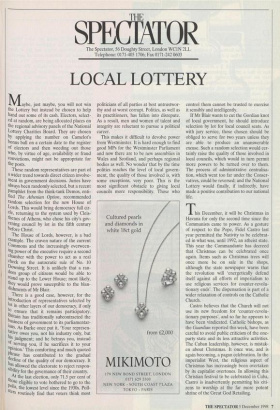The Spectator, 56 Doughty Street, London WC1N 2LL Telephone: 0171-405
1706; Fax 0171-242 0603
LOCAL LOTTERY
Maybe, just maybe, you will not win the Lottery but instead be chosen to help hand out some of its cash. Electors, select- ed at random, are being allocated places on the regional advisory panels of the National Lottery Charities Board. They are chosen by applying the number on Camelot's bonus ball on a certain date to the register of electors and then weeding out those who, by virtue of age, availability or fraud convictions, might not be appropriate for the posts.
These random representatives are part of a wider trend towards direct citizen involve- ment in government decisions. Juries have always been randomly selected, but a recent Pamphlet from the think-tank Demos, enti- tled The Athenian Option, recommended random selection for the new House of Lords. This would bring democracy full cir- cle, returning to the system used by Cleis- thenes of Athens, who chose his city's gov- erning council by lot in the fifth century before Christ.
The House of Lords, however, is a bad example. The craven nature of the current Commons and the increasingly overween- ing power of the executive require a second Chamber with the power to act as a real check on the autocratic rule of No. 10 Downing Street. It is unlikely that a ran- dom group of citizens would be able to stand up to the Lower House; most likely, they would prove susceptible to the blan- dishments of Mr Blair.
There is a good case, however, for the introduction of representatives selected by lot in other layers of our democracy, if only to. ensure that it remains participatory. Britain has traditionally subcontracted the business of government to its parliamentar- ians. As Burke once put it, 'Your represen- tative owes you, not his industry only, but his judgment; and he betrays you, instead of .serving you, if he sacrifices it to your °P, 'Ilion.' This comforting and much quoted Phrase has contributed to the gradual decline of the quality of our democracy. It has allowed the electorate to reject respon- sibility for the governance of their country. At the last election, only 71.5 per cent of those eligible to vote bothered to go to the Polls, the lowest level since the 1930s. Poll- sters routinely find that voters think most politicians of all parties at best untrustwor- thy and at worst corrupt. Politics, as well as its practitioners, has fallen into disrepute. As a result, men and women of talent and integrity are reluctant to pursue a political career.
This makes it difficult to devolve power from Westminster. It is hard enough to find good MPs for the Westminster Parliament and now there are to be new assemblies in Wales and Scotland, and perhaps regional bodies as well. No wonder that by the time politics reaches the level of local govern- ment, the quality of those involved is, with some exceptions, very poor. This is the most significant obstacle to giving local councils more responsibility. Those who control them cannot be trusted to exercise it sensibly and intelligently.
If Mr Blair wants to cut the Gordian knot of local government, he should introduce selection by lot for local council seats. As with jury service, those chosen should be obliged to serve for two years unless they are able to produce an unanswerable excuse. Such a random selection would cer- tainly raise the quality of those involved in local councils, which would in turn permit more powers to be turned over to them. The process of administrative centralisa- tion, which went too far under the Conser- vatives, could be reversed; and the National Lottery would finally, if indirectly, have made a positive contribution to our national life.
This December, it will be Christmas in Havana for only the second time since the Communists came to power. As a gesture of respect to the Pope, Fidel Castro last year permitted the Nativity to be celebrat- ed in what was, until 1992, an atheist state. This year the Commandante has decreed that Christmas can be celebrated once again. Items such as Christmas trees will once more be on sale in the shops, although the state newspaper warns that the revolution will 'energetically defend itself against all efforts of imperialism to use religious services for counter-revolu- tionary ends'. The dispensation is part of a wider relaxation of controls on the Catholic Church.
Castro believes that the Church will not use its new freedom for 'counter-revolu- tionary purposes', and so far he appears to have been vindicated. Catholic bishops, as the Guardian reported this week, have been careful to avoid public criticism of the one- party state and its less attractive activities. The Cuban leadership, however, is mistak- en about Christmas. It once was, and is again becoming, a pagan celebration. In the imperialist West, the religious aspect of Christmas has increasingly been overtaken by its capitalist overtones. In allowing this Christian festival to be celebrated in Cuba, Castro is inadvertently permitting his citi- zens to worship at the far more potent shrine of the Great God Retailing.


















































































 Previous page
Previous page